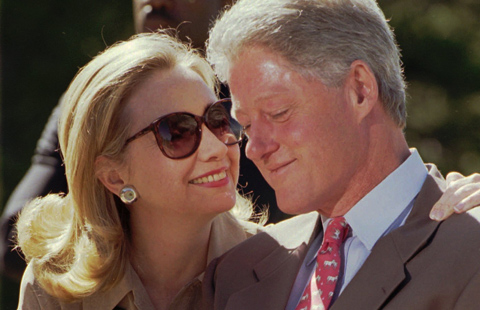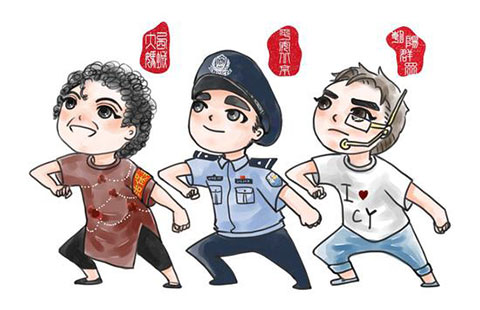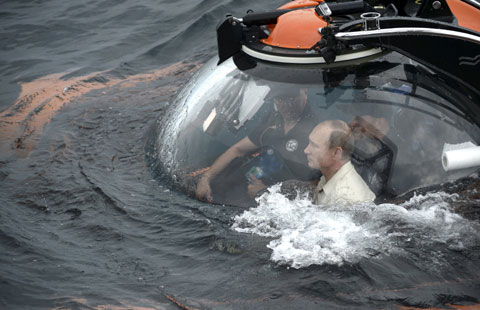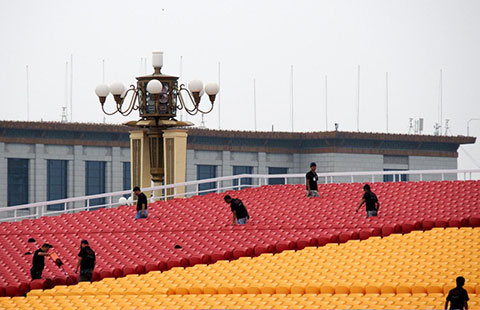Snooping on China-Russia drills poses threat to regional security
Updated: 2015-08-21 07:34
(China Daily)
|
||||||||
China and Russia started their joint naval drills on Thursday in the Peter the Great Gulf and other areas off the Russian coast. The nine days of exercises aim to bolster the comprehensive strategic cooperation and partnership between the two countries' navies, and to increase their military capabilities to counter maritime threats. It is the second joint drill between the two countries this year. Comments:
There should be no over-interpretation of the ongoing naval exercises between China and Russia, which have served as part of annual exchanges for years. The core idea embedded in the bilateral relationship is defensive realism, not forging an anti-West strategic "alliance". The lingering Cold War mentality means both non-aligned powers and allied ones have to avoid making strategic misjudgments.
Yang Cheng, deputy director of the Center for Russian Studies at East China Normal University in Shanghai, Aug 19
The joint exercises held by Beijing and Moscow reflect the comprehensive strategic partnership and solid mutual trust between them, which are conducive to enhancing their practical maritime cooperation and capabilities to cope with security threats. They are not targeted at any specific party, nor associated with China's military parade scheduled for Sept 3.
Zhang Junshe, a senior researcher at the People's Liberation Army Naval Military Studies Research Institute, Aug 19
Washington's "pivot to Asia" policy, Tokyo's persistence in pushing new security bills through the Diet, and their increasingly close alliance, all point to the fact that they want to further strengthen their dominance in the region. By constantly spying on and hindering China-Russia military exercises, irrespective of their own increasing military exercises in recent years, the US and Japan are posing a real danger to regional stability.
Wang Shaopu, a researcher in Japanese studies with Shanghai Jiao Tong University, Aug 19
For the United States, its expanding military presence in the Asia-Pacific region and constant efforts to reinforce the US-Japan alliance have imposed extra pressure on both China and Russia, pushing them to engage in closer military cooperation. Instead of forging a quasi-alliance, Beijing and Moscow have achieved a comprehensive strategic partnership involving less obligations in their coordination, which is already capable of bolstering the regional balance. Otherwise, not only would the global strategic situation, including the US-Japanese ties, be significantly affected, but also Chinese and Russian diplomacy would face grave challenges.
Global Times, Aug 20

 Stars in their eyes: leaders in love
Stars in their eyes: leaders in love
 A survival guide for singles on Chinese Valentine’s Day
A survival guide for singles on Chinese Valentine’s Day
 Beijing police publishes cartoon images of residents who tip off police
Beijing police publishes cartoon images of residents who tip off police
 Rare brown panda grows up in NW China
Rare brown panda grows up in NW China
 Putin rides to bottom of Black Sea
Putin rides to bottom of Black Sea
 The changing looks of Beijing before V Day parade
The changing looks of Beijing before V Day parade
 Nanjing displays ancient marriage, divorce certificates
Nanjing displays ancient marriage, divorce certificates
 Top 10 Android app stores in China
Top 10 Android app stores in China
Most Viewed
Editor's Picks

|

|

|

|

|

|
Today's Top News
Chemical plants to be relocated in blast zone
Giant panda Mei Xiang at US zoo expected to give birth soon
S Korean president to participate in China's war anniversary
Thucydides Trap not relevant to today's Sino-US ties: Opinion
Fitch warns insured losses from Tianjin explosions could reach $1.5b
Conflicting reports on possible Abe trip
Hillary Clinton breaks with Obama on Arctic oil drilling
At UN, China backs regional peace efforts
US Weekly

|

|






